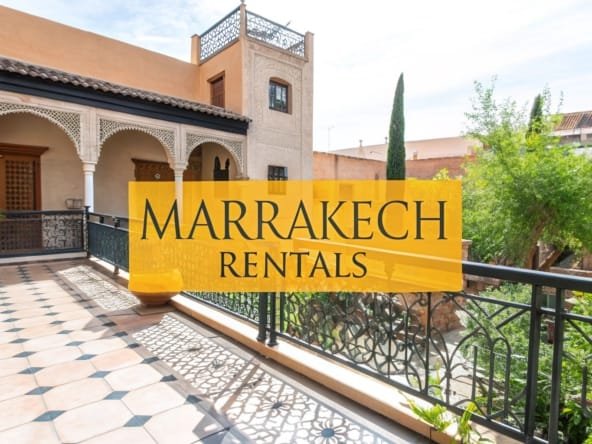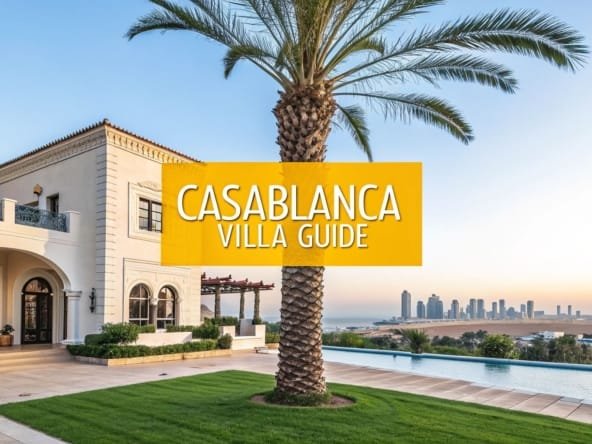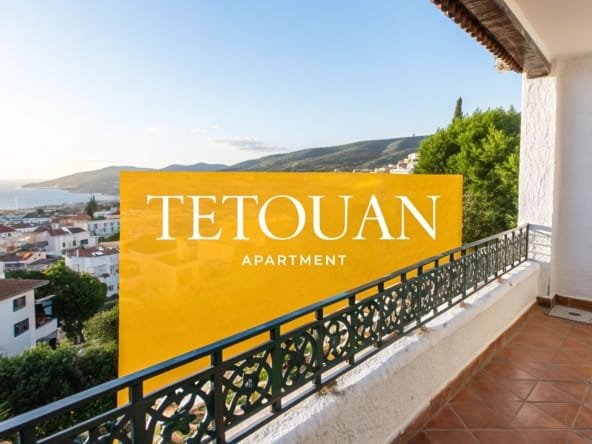Welcome to Oujda, a city that beautifully marries its deep cultural roots with dynamic modern growth, creating some truly unique opportunities for homebuyers. If you're starting your search for a maison a vendre a Oujda, you've come to the right place. Let's explore what makes Oujda's property market tick and why it’s gaining so much attention for its rare blend of affordability and lifestyle—something often lost in Morocco's larger, more frenetic cities.
Your Guide to Oujda's Real Estate Market
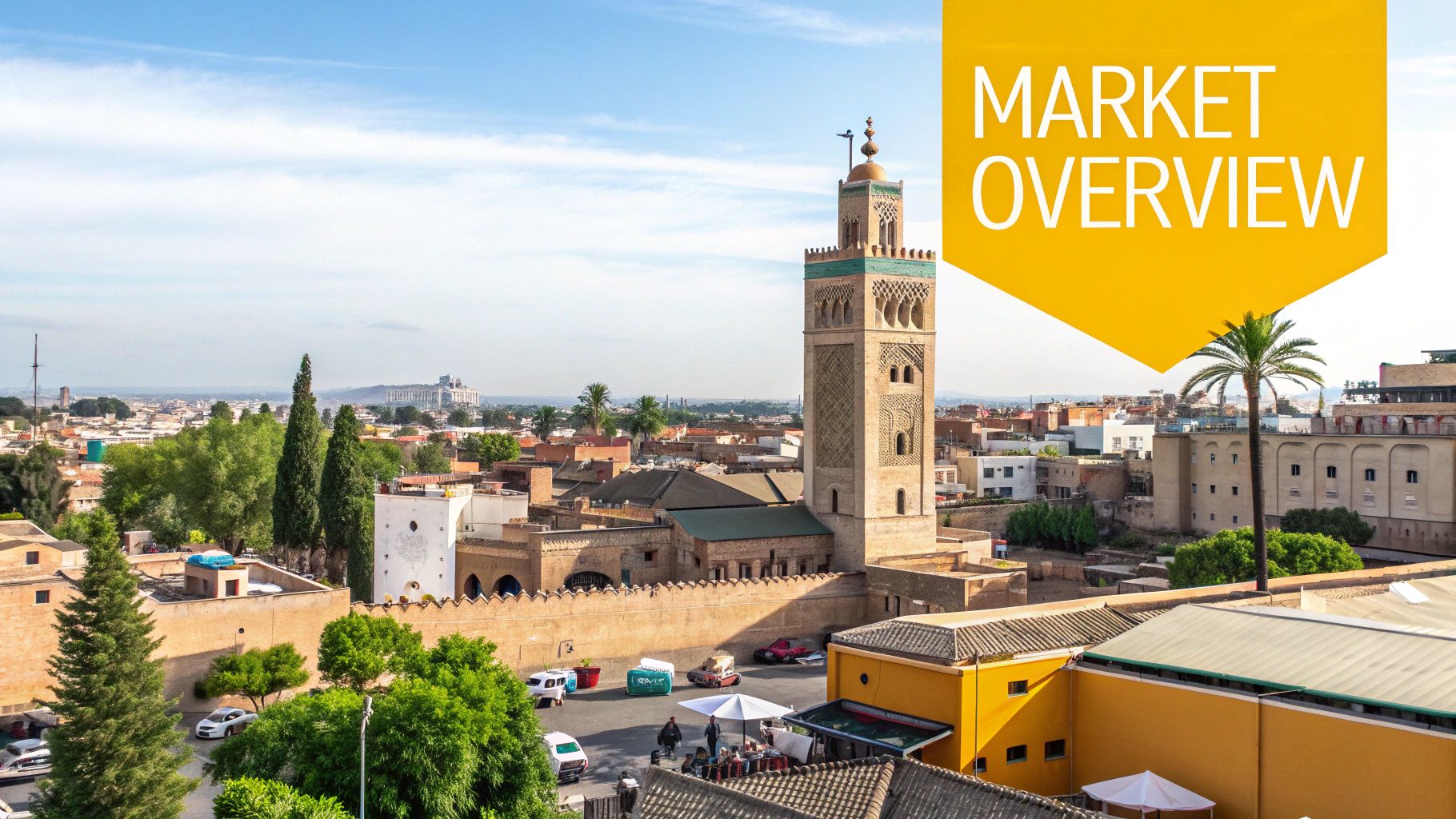
For anyone looking for both value and authenticity in Morocco, Oujda presents a compelling case. It’s a world away from the high-octane, high-cost property markets of Casablanca or Marrakech. Here, you'll find a more grounded and accessible entry point into Moroccan real estate, as the city is in the midst of a steady, thoughtful expansion that respects its rich history while making way for new residential developments.
This unique balance means the property landscape is incredibly diverse. Whether you’re captivated by the idea of a traditional riad tucked into the historic medina or you prefer the modern comforts of a sleek villa in a new, quiet suburb, Oujda’s market truly caters to a wide spectrum of tastes and budgets.
Understanding the Market Dynamics
A huge part of Oujda's appeal comes down to its affordability. Simply put, your money goes much further here. Property prices are significantly lower than in Morocco’s major coastal hubs, which opens the door to more spacious homes and a genuinely comfortable lifestyle without the hefty price tag.
The market here has also proven to be remarkably resilient. For example, while Moroccan real estate as a whole saw a slight dip in early 2024, Oujda’s property values experienced a much smaller decrease of only 2.2% compared to the previous year. That’s a performance that outshines many other urban centres across the country.
The key takeaway here is that Oujda offers a stable and promising environment. It’s a market driven by genuine local demand, not just speculative international interest, which helps anchor its steadiness.
What to Expect on Your Search
As you start hunting for a maison a vendre a Oujda, it helps to have a clear picture of what you're stepping into. Your search will really boil down to three things: the character of the neighbourhood, the type of property you want, and the realities of your budget.
- Neighbourhoods: From the bustling city centre to the serene, family-friendly suburbs like Hay Al Qods or Isly, each district offers a completely different vibe.
- Property Types: Your choices can range from historic 'dars' (traditional courtyard houses) to contemporary apartments and sprawling family villas.
- Budget: Naturally, your investment level will determine the kind of property you can secure, its condition, and its location.
Navigating these choices successfully is all about having a structured approach. Before you even think about scrolling through listings, take some time to outline your priorities. For those viewing this as part of a wider financial plan, it's worth understanding why properties in Morocco are perfect for investment.
To get you started, here's a quick checklist to help you organise your thoughts and prepare for a productive property search in this vibrant eastern Moroccan city.
Oujda Property Buyer's Initial Checklist
This table breaks down the initial things you should think about. It’s a great way to turn a big goal into smaller, manageable steps before you dive in.
| Consideration | Key Details for Oujda | Action Point |
|---|---|---|
| Neighbourhood Choice | City centre offers convenience; suburbs provide space and tranquillity. | Visit different areas at various times of day to gauge the atmosphere. |
| Property Type | Options range from historic riads and dars to modern villas and apartments. | Define your must-have features (e.g., garden, garage, number of rooms). |
| Budget & Financing | Prices are lower than in major cities, offering excellent value. | Get pre-approved for a mortgage to understand your buying power. |
| Legal Checks | Ensure the property has a clear title ('titre foncier'). | Engage a trusted 'notaire' early in the process for due diligence. |
Taking the time to think through these points will set you on the right path, making your search for a home in Oujda far more focused and ultimately more successful.
Discovering Oujda's Best Neighbourhoods
When you start looking for a maison a vendre a Oujda, you quickly realise it’s not just about the four walls and a roof. It’s about the community you’ll be joining. Oujda is a city of contrasts, and the feel of a neighbourhood can change dramatically in just a few streets. Your own lifestyle—whether you're a young professional who loves the buzz of city life or a growing family in need of quiet streets and green spaces—is the single most important factor in deciding where to plant your roots.
The city isn't a monolith. From the ancient, winding alleyways of the medina to the wide-open boulevards of new residential areas, each district offers a completely different way of life. Let's take a closer look at what makes each of Oujda's key areas tick, so you can narrow down the search to a place that truly feels like home.
The Vibrant Heart of the City Centre
If you thrive on energy and want everything just a short walk away, then the city centre is where you need to be. It’s the undeniable hub of Oujda. Living here puts the city’s best at your fingertips. Imagine strolling to the central market for your daily groceries, impromptu coffee meetings on the lively Boulevard Mohammed V, and having all the main banks and administrative offices within easy reach.
The properties here are a fascinating mix. You’ll find traditional Moroccan houses, or ‘dars,’ often built around a private central courtyard—a perfect little escape from the city bustle. There are also plenty of older apartment buildings steeped in character. These homes are perfect for anyone who appreciates historic architecture and wants to be right in the middle of it all.
Of course, that convenience comes with a few trade-offs. The centre is always alive, which means you can expect more background noise and a bit less privacy than you'd find in the suburbs. And as anyone who has tried will tell you, parking can be a real headache.
Hay Al Qods and Isly: Family-Friendly Living
As you move out from the city’s core, you’ll find neighbourhoods like Hay Al Qods and Isly. These areas have become a real draw for families and anyone looking for a more peaceful setting. They feel different—the streets are wider, the infrastructure is more modern, and the whole pace of life just seems to slow down a notch. It’s clear they were designed with community in mind.
Your search for a maison a vendre a Oujda here will likely turn up more spacious options. This is where you'll see a higher concentration of semi-detached and detached villas, many boasting their own private gardens and garages. These are luxuries you’ll rarely find in the city centre. On top of that, these neighbourhoods have better access to parks and well-regarded schools, making them an incredibly practical choice for raising a family.
The lifestyle here is distinctly suburban. While the city centre is just a short drive away, you're essentially trading the ability to walk everywhere for more personal space, more quiet, and a genuine sense of a residential community.
Let's imagine a real-life scenario: a family with two young children is making this exact choice.
- A City Centre Apartment: The upside is being close to the father's office and cultural sites. But the downside is a clear lack of outdoor space for the kids and the potential for street noise to disrupt their sleep.
- A Villa in Isly: Here, the pros are a private garden for the children to play in, a quiet street, and a great school nearby. The only real con is the daily commute into the city for work.
For this family, the improved quality of life and space offered by the suburban villa easily wins out over the pure convenience of a central location.
Emerging Neighbourhoods and New Developments
Oujda is a city that’s growing and evolving, with new residential projects popping up all the time, especially on its outskirts. Areas along the Route de Taza or near the university are hotspots for these new builds. Here you’ll find everything from modern apartment complexes complete with shared pools and gyms to brand-new villas designed with all the latest comforts.
Buying in an up-and-coming area can be a very shrewd move financially. Prices are often much more competitive than in the more established parts of the city, and you get a property that’s brand new, meaning less worry about immediate maintenance or repairs. These areas tend to attract buyers who value modern design and amenities over the historic charm of the older districts.
That said, buying new also means doing your homework. Some of these areas are still a work in progress, so amenities like local shops, restaurants, and public transport links might not be fully established yet. It's crucial to look into the municipality's long-term development plans for the area to make sure it will grow into a community that meets your needs down the road.
A Quick Comparison of Oujda's Neighbourhoods
To help you see the differences more clearly, here’s a simple breakdown of what each type of neighbourhood has to offer.
| Neighbourhood Type | Best For | Property Types | Lifestyle Vibe |
|---|---|---|---|
| City Centre | Professionals, singles, culture lovers | Apartments, Riads, Dars | Energetic, convenient, bustling |
| Established Suburbs | Families, retirees, peace-seekers | Villas, larger homes | Calm, community-focused, spacious |
| New Developments | Investors, modernists, first-time buyers | New apartments, modern villas | Evolving, quiet, contemporary |
At the end of the day, the 'best' neighbourhood is simply the one that fits your life and your budget. My best advice? Go and spend time in each area you're seriously considering. Visit on a weekday morning and then again on a weekend evening. The difference can be stark, and it's the only real way to get a true feel for a place before you commit.
Managing the Finances of Your Oujda Home Purchase
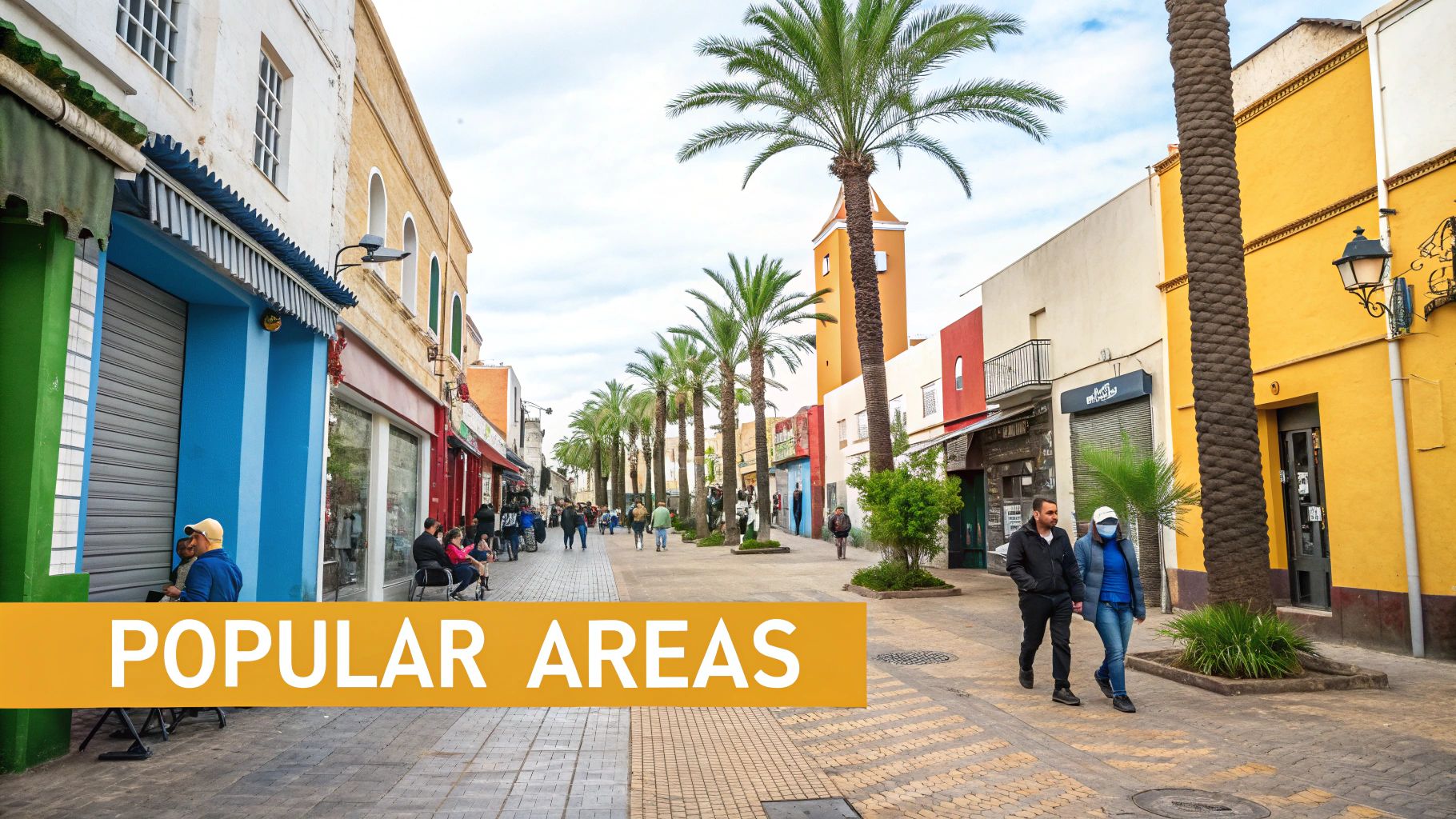
Finding the perfect maison a vendre a oujda is thrilling, but truly mastering the purchase comes down to the numbers. Getting a firm grip on the costs, financing options, and investment potential is what transforms a house hunt from a hopeful search into a smart, confident decision. This goes far beyond the sticker price; it's about understanding the complete financial picture from the get-go.
We'll walk through everything from securing a mortgage to tallying up the final closing costs. For many, a home is also a major investment, so we’ll also explore how an Oujda property can start working for you, generating income and building value for years to come.
Decoding the Total Cost of Purchase
The price you and the seller agree on is just the starting line. In any Moroccan property deal, a handful of other mandatory costs come into play. Budgeting for these upfront is the key to avoiding any last-minute financial surprises.
You should plan for these additional expenses to be somewhere between 7% and 10% of the property’s final price. Let's break down what that includes:
- Notary Fees (Frais de Notaire): The notary is a neutral, government-appointed official who oversees the legal side of the transaction. Their fee is typically 1% to 1.5% of the property value, plus VAT. This covers their work drafting contracts, verifying the property title, and ensuring a clean transfer of ownership.
- Registration Taxes (Droits d'Enregistrement): This is a government tax required to register the property in your name. For a home, you can expect this to be 4% of the purchase price.
- Land Registry Fees (Conservation Foncière): This fee pays for updating the official land registry to reflect you as the new owner. It usually works out to about 1.5% of the property value, plus a small fixed administrative fee.
- Agency Commission: While the seller typically pays the estate agent's commission, it's always smart to confirm this in your agreement. The standard rate is often 2.5% for both the buyer and the seller, plus VAT.
Securing Financing in Oujda
Whether you're a Moroccan resident or an international buyer, you have several routes to finance your purchase. Moroccan banks are quite open to lending to non-residents, as long as you can show proof of a stable income and provide the right paperwork.
For a foreign buyer, the first step is usually opening a convertible Moroccan Dirham (MAD) bank account. This special account is crucial; it allows you to transfer foreign currency into Morocco for the purchase and, just as importantly, lets you repatriate funds if you sell the property down the line. Banks will often finance up to 70% of a property's value for non-residents, which means you'll need to prepare a deposit of at least 30% plus enough to cover all the closing costs we mentioned earlier.
A crucial piece of advice from my experience: get pre-approved for a mortgage before you start your property search in earnest. When you know exactly what you can afford, it gives you a solid budget and puts you in a much stronger negotiating position once you find a home you love.
The Investment Potential of an Oujda Property
An Oujda home can be more than just a place to live; it can be a savvy financial move. The city's growing economy and appeal make it an interesting spot for generating rental income, particularly from short-term holiday lets.
Recent data from the Oriental region really brings this to life. Right now, Oujda has about 128 active short-term rental listings. These properties command an average daily rate (ADR) of roughly $49. With an average occupancy rate of 36%, the city's listings generate a total monthly revenue of around $3,923. You can dig deeper into Oujda's rental market trends and statistics on AirROI.com.

The data shows that the highest-performing properties—those in the top 10% of the market—can earn more than $1,178 per month. This is a clear signal that with the right property, smart management, and strategic pricing, an Oujda home can become a powerful income-generating asset. This is especially true if you're looking for a holiday home that can pay for itself or if you're a pure investor hunting for solid returns.
Understanding the Moroccan Property Purchase Process
Buying a house in Oujda, or anywhere in Morocco, involves a legal process that can feel a bit complex at first. Don't let that put you off. It’s actually a very secure, well-defined system designed to protect everyone involved—buyer and seller alike. Once you understand the key steps, you'll feel much more confident navigating the journey.
Think of it as a clear roadmap. We'll walk through everything from making your initial offer to the day you get the keys to your new home. I'll focus on the two most critical documents you'll sign and explain the vital role of the Moroccan notary, or notaire.
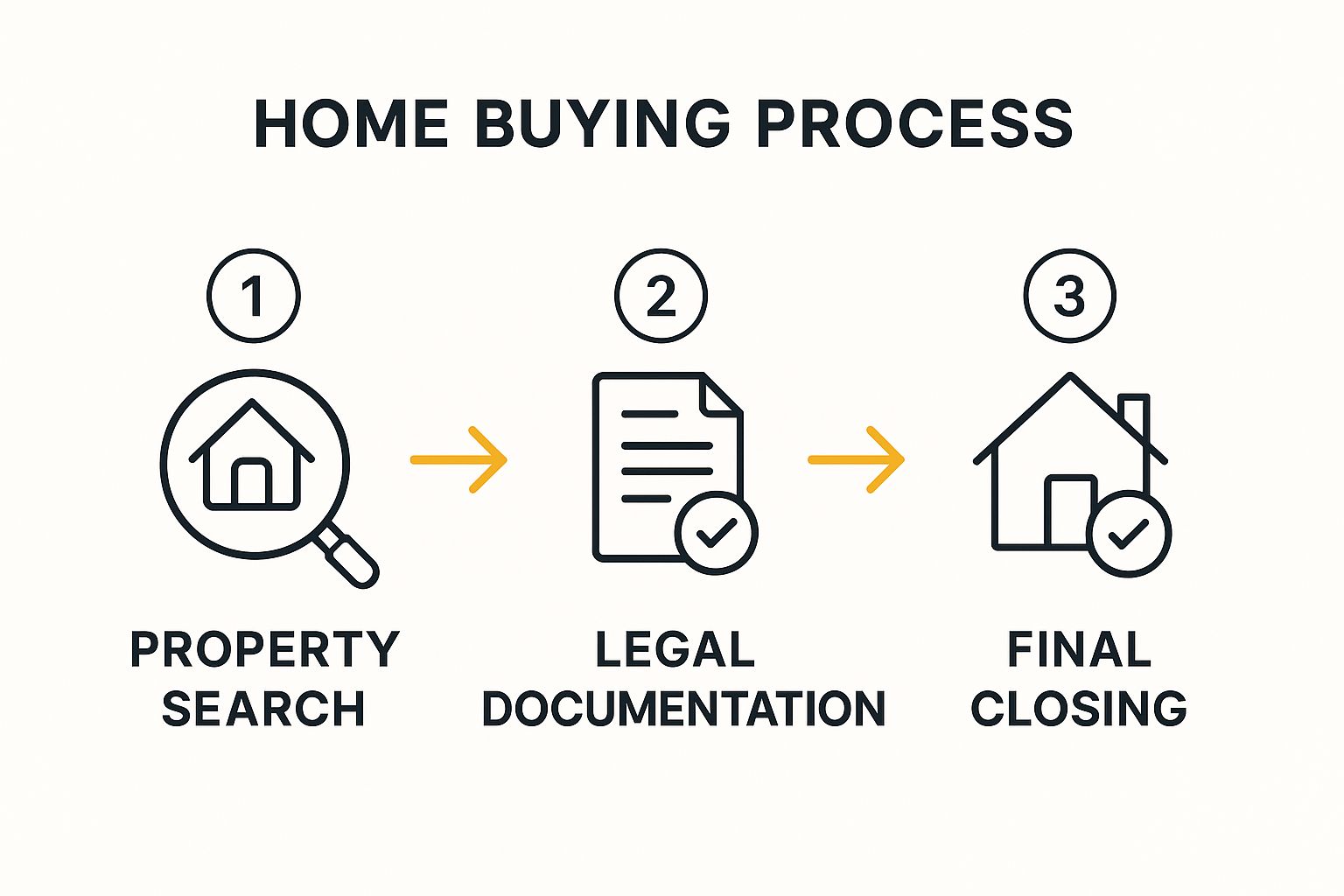
As you can see, it’s a straightforward progression. Each stage builds on the last, ensuring all the legal and financial checks are done before the property officially changes hands. This provides a safety net for the entire transaction.
The Offer and the Preliminary Contract
So, you've found a maison a vendre a oujda that you love. The first real move is to make an offer. Once the seller accepts, you’ll move on to signing a preliminary sales agreement, which in Morocco is called the compromis de vente. This is a big moment. This contract is legally binding and locks in the deal.
It’s much more than just a piece of paper; it’s a detailed agreement that covers all the bases:
- The final sale price you’ve agreed on.
- A full legal description of the property.
- Any special conditions, known as clauses suspensives (for example, making the sale dependent on you getting a mortgage).
- A timeline for completing the final sale.
When you sign the compromis de vente, you'll also need to pay a deposit. This is usually between 5% and 10% of the total purchase price. That money doesn't go to the seller directly; instead, it's held safely in the notary's escrow account until the sale is finalised.
Be aware: This is a serious commitment. If you decide to back out of the purchase after signing this document without a legally valid reason (like a failed condition), you will almost certainly lose your deposit.
The Notaire: Your Guide Through the Legal Maze
In Morocco, the notaire isn't just a lawyer—they are a public official appointed by the government. Their role is to act as a neutral party and ensure the entire transaction follows Moroccan law to the letter. You cannot buy property without one.
The notaire does a lot of heavy lifting for you. Their most crucial job is conducting thorough due diligence. This means they will:
- Verify the seller’s identity and confirm they have the legal authority to sell.
- Perform a deep dive into the property's legal history.
A huge part of this investigation involves checking the titre foncier, which is the property's official title deed. The notaire ensures the title is "clean"—meaning there are no hidden debts, mortgages, or legal claims against it. This single step is the foundation of a secure purchase in Morocco. For a deeper understanding of the legalities, you can learn more about how to buy property in Morocco easily and get comfortable with the framework.
The Final Deed and Getting the Keys
Once the notaire has finished all the checks and confirmed that any conditions from the compromis de vente are met, it’s time for the final step: signing the final deed of sale, or acte de vente.
This is the official moment of transfer. You, the seller, and the notaire will meet, usually at the notary's office. The notaire will read the entire deed out loud to make sure every detail is correct and understood by both parties before anyone signs.
With the acte de vente signed, you'll transfer the remaining balance of the purchase price, plus any taxes and fees, into the notary's escrow account. The notaire then takes the signed deed to the Land Registry (Conservation Foncière) to have it officially registered in your name. While the final registration paperwork can take a few weeks to process, your ownership is legally secure from the moment you sign the final deed.
And then comes the best part: the keys are handed over, and you can officially celebrate owning your new home in Oujda.
How to Inspect and Negotiate Like a Pro
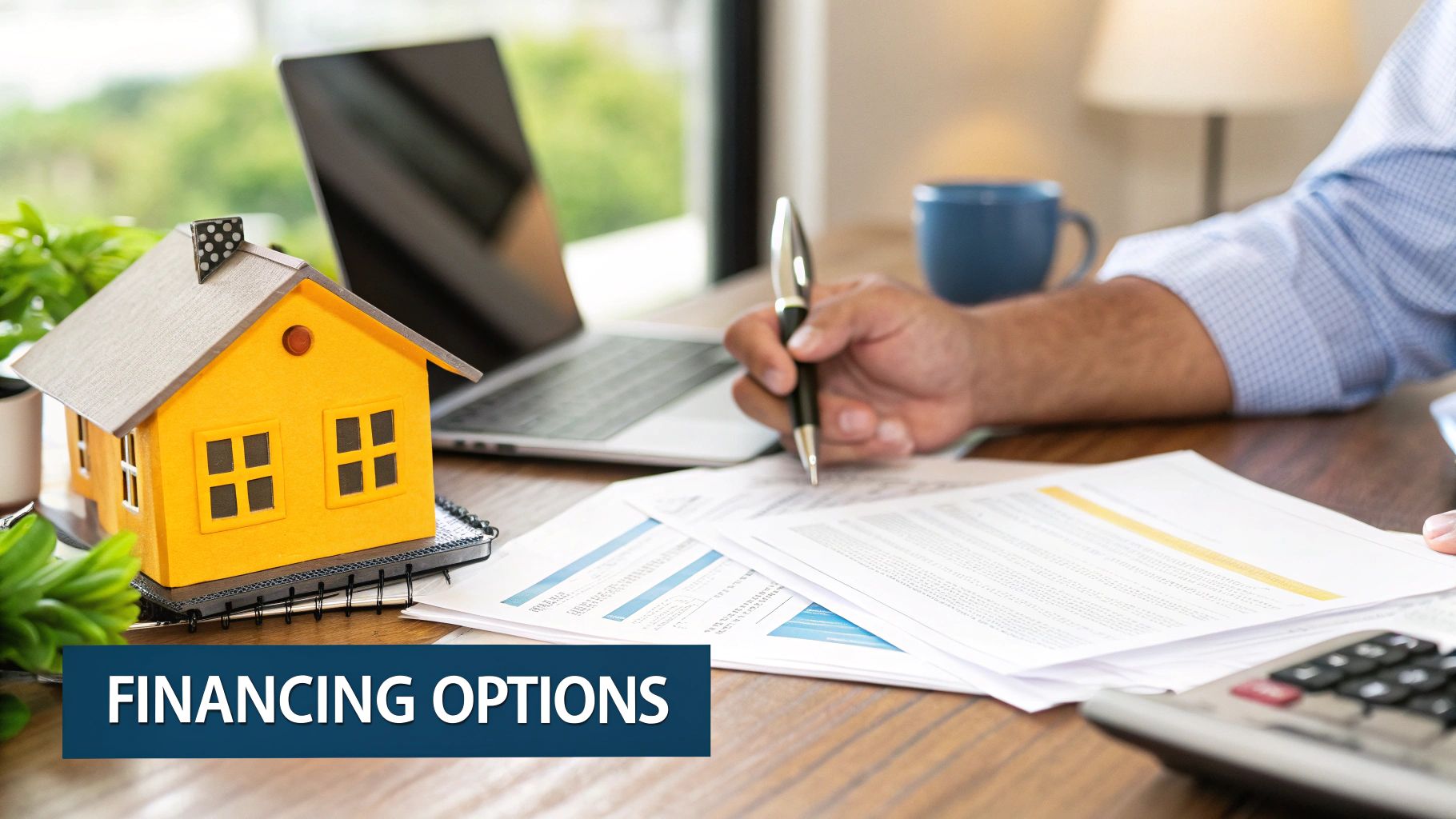
Finding a promising maison a vendre a Oujda is a fantastic start, but the real work begins when you step through the front door. This is where a sharp eye and a smart negotiation strategy can save you a significant amount of money and prevent future headaches. You have to learn to look past the fresh coat of paint and carefully staged furniture to see the property for what it really is.
It’s easy to get swept up in the look and feel of a place, but overlooking small issues now can lead to major expenses down the road. A thorough inspection isn't about finding reasons to walk away; it's about gathering the intelligence you need to negotiate from a position of strength and clarity.
Your Essential Property Viewing Checklist
When you walk into a potential home, your mission is to assess its fundamental health. Go beyond the surface and check the elements that truly impact your long-term comfort and finances.
- Structural Integrity: Keep an eye out for large cracks in the walls, especially diagonal ones near windows or corners, as they can hint at foundation problems. A simple trick is to place a small ball on the floor; if it rolls, the floors might be uneven.
- Signs of Damp: Pay close attention to the bottom of walls, corners, and ceilings. You're looking for tell-tale signs like peeling paint, dark patches, or a persistent musty smell—all classic indicators of water infiltration or rising damp.
- Plumbing and Water Pressure: Make a point to turn on every tap in the house. Is the water pressure strong and consistent? How long does it take for hot water to arrive? Don’t forget to flush the toilets to ensure they’re functioning correctly.
- Electrical Systems: Flick every light switch and take a good look at the electrical panel. An old, messy panel with a tangle of wires is often a red flag that a costly and complex rewiring job is in your future.
- Windows and Doors: Systematically open and close every single window and door. Do they seal tightly? Check the frames for signs of rot, warping, or damage.
Think of yourself as a detective on a mission. Every viewing is a chance to gather clues about the property's true state, and these clues become your most valuable assets during the negotiation phase.
A word of advice from experience: never rely solely on what the seller or agent tells you. Always verify everything yourself. If you feel out of your depth, it’s well worth the investment to hire a local building inspector (expert en bâtiment) for a professional, unbiased opinion.
Crafting Your Negotiation Strategy
With a clear picture of the property's condition in hand, you’re ready to talk numbers. This isn't about aggressive haggling; it’s about presenting a fair, well-reasoned offer that’s firmly grounded in facts.
The current market climate in Oujda actually gives buyers a bit of an edge. Recent data from early 2024 shows that residential property prices in the city saw a slight contraction, dropping by 0.31% nominally and 1.88% after factoring in inflation. This is part of a broader national trend where Moroccan property transaction volumes fell by 3.1% in the first quarter of 2024. Knowing this provides powerful context and creates a more favourable environment for a well-prepared buyer. For more granular detail, you can find valuable insights on property prices in Oujda on agenz.ma.
Moving Beyond Simple Haggling
To make your offer compelling, you need to anchor it to tangible, undeniable points. The negotiation should feel more like a collaborative conversation than a conflict.
-
Start with Comparables: Your agent should equip you with a list of recent sales prices for similar properties in the same neighbourhood. This is your primary evidence for establishing the home's true market value.
-
Factor in Repair Costs: Did your inspection turn up some issues? Get some rough estimates for what it would cost to fix them. You can then use these figures to justify a lower offer. A good way to phrase it is, "We really love the house, but we've had a quote for updating the old electrical panel, which will be around X Dirhams. We’ve had to reflect that in our offer."
-
Understand Seller Motivation: A little digging can go a long way. Try to find out why the seller is moving. Are they in a rush to relocate for a job, or are they content to wait for the perfect offer? Their level of urgency will directly influence their flexibility on the price.
A well-researched offer, combining hard market data with the specific condition of the maison a vendre a Oujda, demonstrates that you are a serious, knowledgeable buyer. This professional approach is always more effective than simply throwing out a lowball number and ultimately leads to a smoother, more successful transaction for everyone involved.
Common Questions About Buying Property in Oujda
As you get closer to finding that perfect maison a vendre a Oujda, you're bound to have some questions. It's completely normal. The Moroccan property market has its own unique rhythm, and it's smart to get a feel for it before you dive in.
To help you navigate the process with confidence, I've put together answers to the questions I hear most often from buyers just like you. Let's clear up any confusion so you can move forward feeling secure.
Can Foreigners Legally Buy Property in Oujda?
Yes, absolutely. This is often the first and most important question for international buyers, and the answer is a reassuring one. Foreign nationals can legally own titled property, known as ‘titre foncier’, in Morocco without any significant hurdles. This covers the vast majority of residential properties you'll encounter in Oujda, from modern apartments to traditional riads and villas.
The only real restriction to be aware of involves agricultural land, which is generally reserved for Moroccan citizens. For anyone looking for a home within the city or its suburbs, this is rarely an issue since most properties are fully titled. It's one of the key reasons why Morocco's real estate is worth your attention on the global stage.
What Is the Role of a Notaire and Do I Need One?
In Morocco, a notaire (notary) isn't just a good idea—they are mandatory for every single property transaction. You can't complete a sale without one. It’s best to think of them not just as a lawyer, but as a neutral, government-appointed official whose sole job is to ensure the sale is legitimate, legal, and correctly executed.
The notaire is the cornerstone of the transaction. They draft and review all legal documents, conduct due diligence by verifying the property's title is clean and free of any debts, and collect all required taxes for the state. They are responsible for officially registering the new deed in your name, which secures your ownership. Their involvement is non-negotiable and provides crucial protection for both buyer and seller.
Your notaire is your primary safeguard in the transaction. They act as an impartial referee, protecting your interests and ensuring every legal detail is correctly handled from the initial contract to the final deed.
How Long Does the Buying Process Typically Take?
While every deal is different, you can generally expect the process to take anywhere from one to three months. This timeline officially kicks off once your offer has been accepted and you've signed the preliminary sales agreement, or compromis de vente.
A few things can affect the speed of the transaction:
- Your Financing: A cash purchase is almost always faster. If you need a mortgage, the bank's approval timeline is a major factor.
- The Notary's Schedule: A busy notaire or a complex title search can add time.
- Paperwork: Delays can easily happen if either the buyer or seller is slow to provide necessary documents.
Being organised and responsive on your end is the best way to keep things moving smoothly.
Are Property Prices in Oujda Negotiable?
Yes, and you should definitely expect to negotiate. In the Oujda market, the asking price is almost always a starting point, not the final word. Most sellers price their property with the expectation that buyers will bargain.
The key to a successful negotiation is to be informed. A low offer without any justification is likely to be dismissed. However, an offer that's supported by solid reasoning—pointing out necessary repairs, or citing the sale prices of similar homes in the area—carries much more weight. This shows you're a serious, knowledgeable buyer and puts you in a much stronger position to agree on a fair price.
At Rich Lion Properties, we specialise in making your Moroccan property journey smooth and successful. Our team provides the expert guidance you need, from the first viewing to the final signature. Start your property search with us today.

